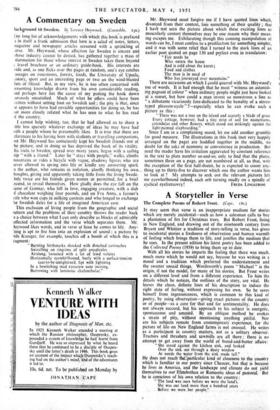A Commentary on Sweden
tackground to Sweden. By Terence Heywood. (Constable. ess.) ftiE long list of acknowledgements with which this book is prefaced s in itself a frank admission that here is a salad of notes, letters, magazine and newspaper articles seasoned with a sprinkling of .erse. Mr. Heywood, whose affection for Sweden is sincere and /hose industry cannot be denied, has gathered together a mass of iformation for those whose interest in Sweden takes them beyond travel brochure or an ordinary guide-book. His interests are .vide and, as one flicks over the pages at random, one's eye catches passages on runestones, forests, foods, the University of Upsala, iistory, sport and an interesting page or two on the wind-blasted lats of Oland. But, in my view, he is too often concerned with ,resenting knowledge drawn from his own considerable reading, Ind perhaps here lies the cause of my putting the book down .uriously unsatisfied. Much of what he offers could have been vritten without setting foot on Swedish soil ; the pity is that, since to appears to have had enviable opportunities for doing so, he has tot more closely related what he has seen to what he has read if the country.
I cannot help wishing, too, that he had allowed us to share a ,ttle less sparsely whatever exchange of ideas he may have had vith a people whom he presumably likes. It is true that there are eferences to his having been with students or travelling companions, Kit Mr. Heywood has consciously kept his Swedish friends out of he picture, and in doing so has deprived the book of its vitality. {is visits to Sweden, spread over many years, began with a sailing rip " with a friend." Later he " stays with people," walks, climbs mountains or rides a bicycle with vague, shadowy figures who are lever allowed to spring into life or kindle any answering spark n the author, who remains in isolation, aloofly thinking his own._ houghts, giving and apparently taking little from the living Swede. )nly twice are his friends given names or permitted, for a brief econd, to reveal themselves. How gladly does the eye fall on the tame of Gunnar, who fell in love, engaging creature, with a slab if chocolate weighing four pounds, and on Fru Anna. a farmer's vife who won cups in milking contests and who longed to exchange he Swedish dales for a life of imagined American ease.
This exclusion of living people from the geographic and social )attern and the problems of their country throws the reader back o a choice between what I can only describe as blocks of admirably .ollected information and the verse which separates them. Mr. leywood likes words, and in verse at least he comes to life. Any- 'sing is apt to fire him into an explosion of sound ; a picture by slits Kreuger, for example, touches off a bomb of which this is a 'ragment:
"Bursting birthmarks shocked with douched cartouches Swivelling on ring, ims of split arcspicules
Airslung. loosened with a lot of lewd volutes Horizontally eyewhirlbound, burly with a surface-tension taut-to-be-untightened, lipt with lightning In a bewitching mad eyescrew sane incising, Burrowing with luminous chafenebulae."
Mr. -Heywood must forgive me if I have quoted lines which, divorced from their context, lose something of their quality ; that I havb not seen the picture about which these exciting lines so muscularly contort themselves may be one reason why their mean- ing escapes me. Exhilarating though this cunning manipulation of words can be, I must confess to a predilection for something simpler, and it was with some relief that I turned to the stark lines of an earlier poet quoted on page 130 and perfect even in translation:
" Fire needs he Who enters the house And is cold about the knees; Food and clothes The man is in need of Who has journeyed over mountains."
There are occasions on which I could quarrel with Mr. Heywood's use of words. It is bad enough that he must " witness an astonish- ing pageant of colour " when ordinary people might just have looked at a sunset, but how could a man invent so monstrous a line as " a debutante vicariously fore-dedicated to the banality of a stereo- typed pleasure-cycle "?—especially when he can evoke such a picture as this : "There was not a tree on the island and scarcely a blade of grass. Every cottage, however, had a tiny strip of soil for nasturtiums, calendulas and other flowers, which stood out strikingly against the light-painted clapboarding."
Since I am in a complaining mood, let me add another grumble for good measure. The illustrations in this book (not very happily arranged on the page) are huddled together in the middle, no doubt for the sake of economy or convenience in production. But need the reader have his irritation aggravated by constant reference in the text to plate number so-and-so, only to find that the plates, sometimes three on a page, are not numbered at all, so that, with the exception of the first half-dozen, he is expected to count any- thing up to thirty-five to discover which one the author wants him to look at ? My attempts to seek out the relevant .pictures left me eyewhirlbound indeed, each orb turning madly on a spindle of


































 Previous page
Previous page